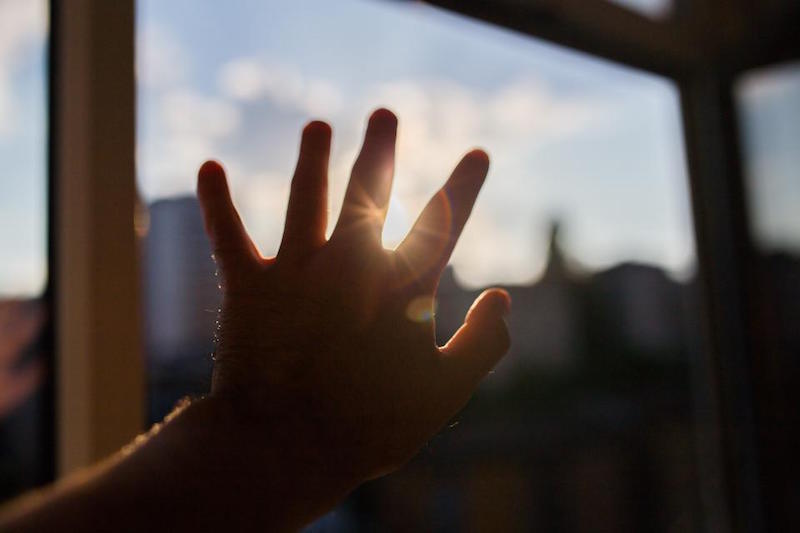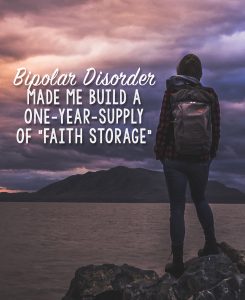My Bipolar Disorder Made Me Build a One-Year-Supply of “Faith Storage”
“When I do what’s right I feel good. I feel happy when I do what I should.”
Chances are you sang these words as a kid back in Primary. Unfortunately, for a lot of us, their message is much easier said than done.
A key part of our experience here on earth (and for some of us it seems to be key-er than others) is that we experience a wide range of emotions. Emotions are a good thing. They give us information. When we “feel” good about something, we do it. When we “feel” bad, we refrain. Easy enough, right?
Well, actually it isn’t. Not always, anyway. Especially when your emotions are totally untrustworthy. I have bipolar disorder. Believe me, I know what that’s like. But even without a specific disorder, things can happen to any of us that make our feelings unreliable.
If we can’t always trust our feelings, how can we possibly discern truth? Are we doomed to stumble around in the dark forever?
I discovered a way for us to discern truth and find hope, even when our emotions skew our perspective. In doing so, I learned that the Lord has no intention of leaving any one of us behind. He is able to uplift all of his children—not in spite of, but through our trials.
Take last November for example.
Ask the Right Questions

Things had been going so well for me. Riding high on what is medically referred to as “mania,” I’d been extremely energetic, highly motivated, and ferociously engaged in several good causes. I was unstoppable.
Or so I believed.
There was just one little thing I’d forgotten (as usual): mania doesn’t last forever. After three months of intense productivity and exaggerated optimism, depression hit me like a ton of lead-infused bricks.
Luckily for me, I knew what was happening. Four years had passed since my initial diagnosis, so sudden, deep depression wasn’t exactly a new concept for me. What caught me off guard, however, was a chilling, new question that had entered my thoughts:
If depression and mania skew your view of reality, then how will you ever know what’s real and what’s not?
It’s an interesting question, from the outside looking in. But when you’ve just made a fifty-foot emotional dive, well—I was terrified.
So what was I going to do? I’d always been so fixed on figuring out what wasn’t real, I’d forgotten to figure out what was. To survive these horrible mood swings, I was going to have to find a way to ground myself—to remember that light exists when all seems dark around me.
The solution came to me in the form of a notebook.
Be a Truth Finder

Sometimes you’ve got to go back to the basics. Sure, deep doctrine is great, but when life gets really, really hard, the first things we tend to question—or lean on, depending—are those simple truths. Is there really a God? Does He love me? If He does, then why did [insert trial] have to happen to me?
There are plenty of ways to answer these questions. The trick is remembering the answers when you really need them.
Now, I’ve never been good at keeping a journal. I always feel like I have to write everything down. (Envisioning my posterity reading over my shoulder doesn’t help either.) But when the depression finally subsided, I was determined to find a way to solidify truth in my mind.
I was inspired one evening while flipping through a newly purchased notebook. What if I skipped over names and places altogether? I thought. What if I just focused on writing down the things I know and learn every single day? Because even in my darkest moments, I know I’m always learning something.
So, I started what I like to call my “Truth Journal.” Here’s what I’d recommend to anyone interested in doing the same:
- Start by writing down some basic realities. I mean really basic. I believe my first entry mentions my favorite foods—which, hey, are a fact no matter what I’m feeling, right? Well, that’s the idea.
- Make a list of the people who really, truly care about you. When things get tough, that’s who you’ll want to turn to. For me, that includes my family (extended family included), my roommates, a list of friends, and my Heavenly Father.
Remember that last one. Drill it into your head. His love is probably the first thing you’ll question when things go south—and yet it’s the most important thing we need to remember.
- Search the scriptures and the words of the prophets. As the pages of my journal filled with simple truths, I knew it was time to start searching harder. As prompted in a blessing, I began to write down scriptures, general conference quotes, and impressions that came to me during church.
In under a month, I’d gone from a truth happen-upon-er to a truth Indiana-Jones-er. I was searching for it, enthusiastically, everywhere I went.
And I was finding it. Oh, was I finding it. Instead of just grounding myself, I was building on myself in ways I’d never thought possible.
Reach for the Light

President Henry B. Eyring knew what he was talking about when he said,
[quote_box_center]We will need to have developed and nurtured faith in Jesus Christ long before Satan hits us, as he will . . . . Those spiritual storms are already raging. We can expect that they will worsen until the Savior returns. However much faith to obey God we now have, we will need to strengthen it continually and keep it refreshed constantly.[/quote_box_center]
I’d recommend his talk “Spiritual Preparedness: Start Early and Be Steady” to anyone and everyone—
—because his advice is so crucial! I was certainly feeling its effects towards the end of Christmas break. Having built up my Faith Storage consistently for two months, I felt better prepared for the weight of life’s challenges—which was good, because one of them was headed my way.
Although I’d had an awesome Christmas break with my family in Australia, I found myself stumbling over my emotions again. I wasn’t sure why, but I couldn’t seem to feel hopeful about the upcoming New Year. In fact—all I could see in my future was misery.
Sound familiar?
This state of mind trapped me, body and soul, for some time. But even in my fearful state, I was determined to regain the hope I had found. I knelt at my bedside every morning and night, and read my scriptures diligently.
My search for truth hadn’t stopped. Quite the opposite; despite what I was feeling, my search intensified.
And a funny thing happened. My feelings didn’t dissolve, as many of you might assume—they can’t. That’s not how bipolar disorder works. But in my state of darkened thoughts, there was something very faint glimmering off in the distance. Hope. Though I had very little motivation to do much else, I found myself reaching for it. Hoping for it. Waiting for it.
I knew, now, that no matter how high I climbed or how far I fell, truth was truth, and that would not change.
Turn Truth into “Faith Storage”

What’s the point of truth finding if you just set your findings aside and forget about them? You need to create a system of “Faith Storage” that you can access in those dark moments when you need hope.
Many of you have at least heard of President Gordon B. Hinckley’s talk, “If Ye Are Prepared Ye Shall Not Fear.” For those of you who haven’t, you’ll want to read it. It’s fantastic. I’d like to draw your attention, however, to the final few paragraphs, which mention the importance of food storage.
Food storage is interesting, because it doesn’t work the way regular storage does. People often forget that food storage requires regular maintenance. “Faith Storage” works the same way. Here’s how:
- Store a variety of things you really need—things that will nourish you. You can’t just throw fifty jumbo-cans of wheat in your basement and think that you’re done. You need to choose things that are, well, preferably edible, nourishing, delicious! The same principle applies to Faith Storage. If your faith is dwindling in a specific area of your life, that is the place to start.
Here are some suggestions:
- Focus your personal scripture study and prayers on the topic you need help with.
- Research General Conference talks on the subject and record favorite insights into your notebook.
- Try to be more obedient in that area of the gospel—test the principle so you can experience the fruits it provides.
- Use the things that you’ve stored. Canned goods don’t last forever, despite what grandma might think—I’ll pass on those green beans from 1983, thank you. You need to check on your food storage and use it regularly. Faith Storage works the same way. Go back and review past entries in your Truth Journal to remind yourself of the things you have learned.
- Replenish your supply. Obviously, as you use up your food storage, you need to build it up again with new supplies. On the spiritual side, your ongoing need for spiritual nourishment requires you to replenish your Faith Storage by adding continually to your supply of truth. As you receive “line upon line, precept upon precept”, your light will grow “brighter and brighter until the perfect day.” (2 Nephi 28:30; D&C 50:24; see also Alma 12:9-11).
It Makes a Difference

Let me repeat: write down the things that you learn. I can’t stress this enough. Your memory is simply not to be trusted. If you’re depressed you’ll remember things in a negative light, and if you’re manic, well, you probably won’t remember anything at all. Your only hope is to lean on those things you know to be true.
To get a feel for what this can mean, I’ll send you to 3 Nephi 10:9-10:
[quote_box_center]And it came to pass that thus did the three days pass away. And it was in the morning, and the darkness dispersed from off the face of the land, and the earth did cease to tremble, and the rocks did cease to rend, and the dreadful groanings did cease, and all the tumultuous noises did pass away.[/quote_box_center]
[quote_box_center]And the earth did cleave together again, that it stood; and the mourning, and the weeping, and the wailing of the people who were spared alive did cease; and their mourning was turned into joy, and their lamentations into the praise and thanksgiving unto the Lord Jesus Christ, their Redeemer.[/quote_box_center]
The Nephites learned that, thanks to the Savior, light and hope can replace darkness and despair.
 No matter how dark or scary or stressful or anxiety-ridden some days may be, I promise that there is truth. You can trust in it. Darkness passes. God still has a plan for you. There is always, always hope.
No matter how dark or scary or stressful or anxiety-ridden some days may be, I promise that there is truth. You can trust in it. Darkness passes. God still has a plan for you. There is always, always hope.
Now get out there and start Indiana Jones-ing!
Do you know anyone who’s had an experience like mine? Share this article with them! Who knows—it may be the start of a faith-changing conversation.


